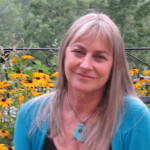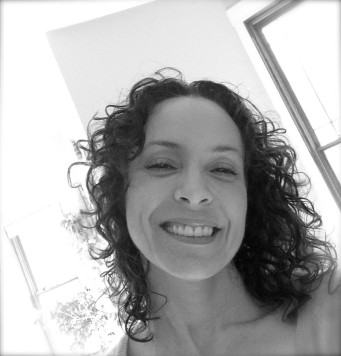When Susan Campbell began hosting a women’s expressive movement/dance class and women’s circle at Asheville Community Yoga, she launched it as a way to provide women a place of self-expression and uninhibited connection.
“I started the class because there is so much dance going on in Asheville, and I wanted to have a space for women to just come together in a real safe space to be able to express [themselves] without having that mixed energy going on,” says Campbell.
Gender-mixed dance classes and female-only dance classes offer different experiences that people can learn and grow from, says Campbell, but she feels that women are able to express themselves more freely in a women-only class.
“When men and women are in the room together, there is a different energy than when all women are in a room together, or all men are in a room together,” says Campbell. “I don’t want to label it good or bad, but I hear from a lot of women that they feel more free to be themselves without stepping into a preconceived role of what they need to act like in front of a man.
“Most of us who grew up in this culture learned that when we are around a man that we should act a different way or only show certain parts of ourselves,” she says. “The class gives women a sense of sisterhood, a sense of safety and a place to let all that feminine energy and power come through in that space.”
Campbell also saw the class as a way to bring more movement and healing into people’s lives. “I am an … acupuncturist and psychotherapist, and I ended up doing a lot of work with people and movement,” she says. “I saw how much was getting stuck in our bodies, and I began to see how much more people can work through after opening space in themselves and their bodies.”
What people get out of the class varies by the participant and the intentions they come in with for themselves, says Campbell.
Participants are greeted with warm-up music upon arrival and then settle in for an opening circle, where intentions for the class are set. Campbell helps the class get grounded and become present.
After the opening circle, a guided body warm-up gets participants loose and moving. Then a dance wave starts in which Campbell features five styles of music and rhythms, such as slow, staccato, chaos, lyrical and stillness. “It takes you through all different energetics of music and energetics of yourself,” she says.
Campbell provides inspirational guidance and suggestions during the dance-wave portion of the class, but participants are free to move as they feel motivated.
“It’s an internal experience, but the talking is there to help people go a little bit deeper,” she says.
After the dance, most people say that they feel a lot more accepting and open, she says, adding that instead of limitations, they see more possibility in their lives.
A women’s circle follows the class. The circle’s purpose is to create a greater sense of community, where women help remind each other of the fullness of their lives through empathy and positivity, say Campbell.
All who identify as female, including transgender folks, are welcome to attend the class and the women’s circle, she says. There are no age restrictions, and the setting is wheelchair-friendly.
Breaking tradition
Sometimes, women-focused experiences are born out a need to represent those who have been historically left out of a certain sect or philosophy.
“Our overarching goal is to offer the dharma, or Buddhist teachings, to the community,” says Simone “Chimyo” Atkinson, head of practice, ordained priest and a dharma student of the Rev. Teijo Munnich, founder of Great Tree Zen Temple in Alexander. “Rev. Munnich has goals of reaching women in particular, who she has felt historically have been left out of the main practice of Zen Buddhism, and providing a place for women’s practice to thrive.
“There is a [stigma] in our culture where women are either discouraged from expressing their practice or their ideas in a mixed situation,” Atkinson says. “And so, the idea of women practicing together on a daily basis exclusive of men allows them to create their practice and build it in the same way that men have built it over centuries because it really has been a practice that has excluded women from its origins in China until more recently.”
While men are welcome to participate in basic everyday sittings, meditations and retreats at the temple, only women can live there and practice full time.
It’s similar to the way Catholic nunneries, convents or girls schools operate, where women promote or create their own practice, Atkinson explains. “Not that it is something that is exclusive or separate, but it is something that comes out of women’s practice without the prejudices and interference that the general society throws in there,” she says.
The temple offers a variety of ways for participants to get involved, such as poetry evenings, morning seated meditations, family days, yoga, writing workshops, lectures, retreats and extended study experiences. A recently launched women’s practice circle offers meditation, discussion, study, creative expression and community building.

Women looking for spiritual experiences geared toward awakening their inner goddesses might find interest in the shamanic priestess process, which Anyaa McAndrew offers within the Isis Cove community in Whittier, an unincorporated community that straddles Jackson and Swain counties.
McAndrew is a licensed, transpersonal shamanic psychotherapist, an ordained high priestess and teacher, a certified shamanic breathwork facilitator, a couples therapist, a master shamanic astrologer, a bishop in the Madonna Ministry and a shamanic global minister with Venus Rising. The work she does through the shamanic priestess process seeks to help women awaken, enliven and integrate their inner priestesses as well as create their own unique sacred work.
“One area of specialty of that work is called the wounded feminine,” says McAndrew. “I really feel that with all the progress that we have made as women, we still have a lot of wounds. Those wounds come from father wounds, the patriarchy we are born into, and they also come from our own inner patriarch — a force within us that wants to hold us back, keep us down and, basically, tell us that we aren’t good enough because we are women.
“That wounded feminine needs to be confronted and worked with,” she says. “The more that we can work with that and heal it in different ways, the more that we can step into who we really are; we can’t do that in … circles with men.”
McAndrew focuses her work on helping women develop the goddesses they are within.
“I am not so much focused on studying the goddess, or even about knowing about who the goddesses are, as much as embodying the goddess, or divine feminine, within,” she says. “The time has come for us to stop looking outside of ourselves [for healing], and it’s time for us to walk in ourselves.”
McAndrew offers personal retreats, advanced shamanic priestess circles and training in the shamanic priestess process.
“These circles and retreats are geared toward women who know they are ready for something else — that are ready to consolidate a healthy inner masculine and/or ready to go to another level of consciousness to integrate a new understanding of the feminine,” she says.
While McAndrew doesn’t have any introductory classes or circles currently scheduled, women interested in learning more are welcome to contact her directly.
So whether you’re drawn to dancing, sitting on a pillow to open your mind, or embracing the chants of the ancestors in a women’s circle, any one of these women’s spiritual experiences could provide new insights into yourself — and the world.
MORE INFO
Campbell’s women’s expressive movement/dance class is held Mondays from 5 to 6:15 p.m. at Asheville Community Yoga. The women’s circle follows the class from 6:30 to 7:30 p.m.
ashevillecommunityyoga.com/teachers/susan-campbell
The Great Tree Zen Temple, Alexander
greatreetemple.org
A women’s practice circle gathers once a month on Wednesdays from 6 to 7:30 p.m.
Anyaa McAndrew, shamanic priestess process
goddessontheloose.com or 631-0657




Before you comment
The comments section is here to provide a platform for civil dialogue on the issues we face together as a local community. Xpress is committed to offering this platform for all voices, but when the tone of the discussion gets nasty or strays off topic, we believe many people choose not to participate. Xpress editors are determined to moderate comments to ensure a constructive interchange is maintained. All comments judged not to be in keeping with the spirit of civil discourse will be removed and repeat violators will be banned. See here for our terms of service. Thank you for being part of this effort to promote respectful discussion.